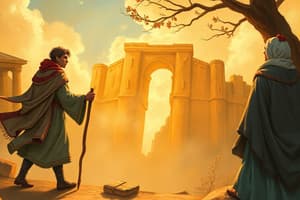Podcast
Questions and Answers
Which term refers to the foundational texts that serve as the basis for understanding the evolution of English literature?
Which term refers to the foundational texts that serve as the basis for understanding the evolution of English literature?
- Scroll
- Codex
- Canon (correct)
- Scripture
Who is known for works such as Beowulf, Shakespeare's plays, and the novels of Charles Dickens?
Who is known for works such as Beowulf, Shakespeare's plays, and the novels of Charles Dickens?
- William Faulkner
- F. Scott Fitzgerald
- Jane Austen
- Charles Dickens (correct)
In which genre might students encounter works by William Wordsworth, Robert Browning, and Emily Dickinson?
In which genre might students encounter works by William Wordsworth, Robert Browning, and Emily Dickinson?
- Poetry (correct)
- Romantic comedy
- Thriller
- Science fiction
Which genre allows students to explore unique perspectives on various themes and ideas?
Which genre allows students to explore unique perspectives on various themes and ideas?
Who might students explore in the drama genre according to the English syllabus?
Who might students explore in the drama genre according to the English syllabus?
Which author's works are examples of non-fiction texts that students might explore?
Which author's works are examples of non-fiction texts that students might explore?
What is one of the literary techniques that students learn to analyze in the English syllabus?
What is one of the literary techniques that students learn to analyze in the English syllabus?
Which theme is commonly explored in Shakespeare's Romeo and Juliet?
Which theme is commonly explored in Shakespeare's Romeo and Juliet?
What is one aspect of literary criticism that students learn through close reading?
What is one aspect of literary criticism that students learn through close reading?
In literature, which term refers to a writing technique that conveys meaning beyond the literal sense?
In literature, which term refers to a writing technique that conveys meaning beyond the literal sense?
Which author is known for using satire in Gulliver's Travels?
Which author is known for using satire in Gulliver's Travels?
What does the field of literary criticism focus on?
What does the field of literary criticism focus on?
Flashcards are hidden until you start studying
Study Notes
English Syllabus: Exploring the World of Literature
The English syllabus, a cornerstone of education worldwide, includes a diverse range of subjects. Within this framework, literature holds a prominent position. In this article, we'll delve into the English syllabus's focus on literature, shedding light on the texts, genres, and concepts that students encounter in this engaging and enriching discipline.
Foundational Texts
English literature is typically introduced through a series of foundational texts. These texts, often referred to as the "canon," are the cornerstones of English literature. They include works such as Beowulf, Shakespeare's plays, and the novels of Charles Dickens. These texts serve as the basis for understanding the evolution of English literature, as well as its unique cultural and historical contexts.
Genre Exploration
The English syllabus encourages students to explore a diverse range of genre, including poetry, prose, drama, and non-fiction. Each genre offers students unique perspectives on various themes and ideas. For example, in poetry, students might encounter works by William Wordsworth, Robert Browning, and Emily Dickinson, while in drama, they might explore the works of William Shakespeare, Oscar Wilde, and Tennessee Williams. In non-fiction, students might explore texts by authors such as Malcolm X, Elie Wiesel, and Virginia Woolf.
Literary Techniques
As students journey through the English syllabus, they encounter a variety of literary techniques. These techniques might include metaphor, irony, satire, symbolism, and allegory. Students learn to identify, interpret, and analyze these techniques to understand the deeper meanings and themes within the texts they are studying. For example, students might learn to identify the use of metaphor in William Blake's poetry or appreciate the satirical undertones in Jonathan Swift's Gulliver's Travels.
Themes and Ideas
The English syllabus presents students with a myriad of themes and ideas to explore. Some of the most common themes include love, death, identity, and justice. Students also learn to appreciate the interplay between these themes and the various literary techniques employed by authors.
For example, students might explore the theme of love in Shakespeare's Romeo and Juliet or the theme of identity in Toni Morrison's Beloved. By studying the interplay between these themes and the literary techniques employed by the authors, students learn to appreciate the nuances and complexities of these texts.
Literary Criticism
The English syllabus introduces students to literary criticism, a field of study that focuses on analyzing texts and their cultural, historical, and literary contexts. Students learn to critically analyze texts in a variety of ways, including through close reading, theoretical analysis, and historical contextualization.
For example, students might explore the historical context of a text in order to appreciate its social, cultural, and political implications. They might also learn to analyze texts using theoretical frameworks such as feminism, post-colonialism, and queer theory. Through this process, students learn to develop a more nuanced and informed understanding of the texts they are studying.
Conclusion
The English syllabus provides students with a rich and diverse range of texts, genres, and literary techniques. By studying these texts, students develop their analytical, critical, and interpretive skills, while also exploring a variety of themes and ideas. The English syllabus offers students a unique opportunity to appreciate the beauty, complexity, and richness of literature, while also developing a more nuanced and informed understanding of the world around them.
Studying That Suits You
Use AI to generate personalized quizzes and flashcards to suit your learning preferences.




